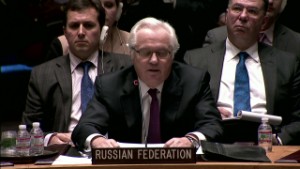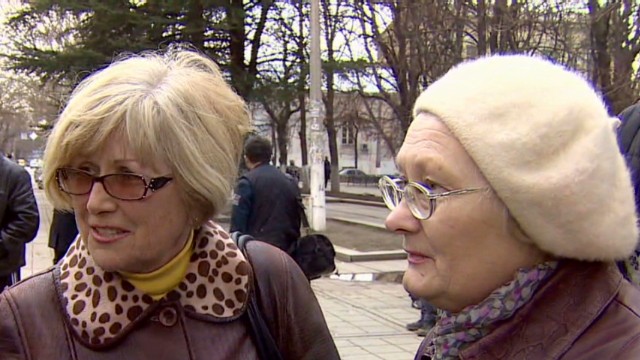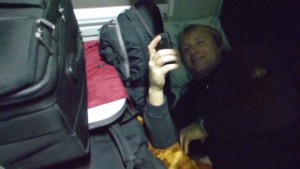Editor's note: Alexander J. Motyl is professor of political science at Rutgers University-Newark. He served as associate director of the Harriman Institute at Columbia University from 1992 through 1998. A specialist on Ukraine, Russia and the USSR, he is the author of six academic books and several novels, including "The Jew Who Was Ukrainian," "My Orchidia," and "Sweet Snow." Motyl writes a weekly blog on "Ukraine's Orange Blues" for World Affairs Journal.
(CNN) -- As President Obama and Ukrainian Prime Minister Arsenii Yatseniuk were discussing the Russian occupation of Crimea this week, I confess that my mind and heart were elsewhere.
I have never experienced war or the threat of annihilation. But now, thanks to the Internet, like thousands of other Ukrainian-Americans I am living at the edge of an existential abyss. The violence—the war—that threatens Ukraine does not threaten me. I am in New York and Ukraine is thousands of miles away. But war will threaten my friends, colleagues and family in Ukraine. We Ukrainian-Americans must now live with the very real possibility that their lives could be extinguished if Russian President Vladimir Putin chooses to do so. Indeed, Ukraine could even disappear as a state, if he chooses to make it disappear.
The Internet has inserted the reality and possibility of mass death into our lives. We watch events unfold in real time. And we watch these events unfold all day, every day. There is no respite. There is no pause.
 Alexander Motyl
Alexander Motyl Ukrainians in Ukraine must live with the tangible threat of physical annihilation. We must live with the virtual threat. Their fears are palpable. The consequences for them of war and violence are real: destruction and death. The consequences for us are virtual: We are witnesses to tragedy and mass killings. We watch, our eyes glued to our computer screens, and we imagine the horror.
Our empathy is not abstract: Our friends, colleagues and relatives are real people. Neither is our feeling of impotence abstract: It gnaws at our insides and reminds us that we, too, are dying, albeit spiritually.
For three months, starting in late November, when the mass pro-democracy demonstrations began in downtown Kiev, and ending on February 21, when Ukraine's version of Papa Doc Duvalier, Viktor Yanukovych, fled and people power triumphed, we had been witnessing daily regime violence punctuated by a few killings in January and mass killings just before the regime collapsed.
 Ambassador: Russia doesn't want war
Ambassador: Russia doesn't want war  Voices on the Ukraine/Crimea referendum
Voices on the Ukraine/Crimea referendum Every morning, turning on my computer, I wondered whether this was the day the criminal Yanukovych regime would crack down, as it continually threatened to do. If all that happened that night was a disappearance or two, a few savage beatings and fire-bombings of cars, we Ukrainian-Americans breathed a sigh of relief. You see, we had actually gotten used to daily terror. We, like the demonstrators in Ukraine, could live with that. After all, they had been living with the violence and predations of the Yanukovych regime since 2010.
 The long trek from Sevastopol to Donetsk
The long trek from Sevastopol to Donetsk What we feared above all was mass violence. And then it happened.
On Tuesday, February 18, about 16 demonstrators and 10 police officers were killed. We were shocked and mourned their deaths, while hoping and expecting the violence to ebb. On Wednesday, February 19, nothing happened and our hopes appeared to be justified. On Thursday, February 20, the regime ordered snipers to shoot randomly at demonstrators. Scores died. And, thanks to the Internet, we saw them being mowed down. The violence had come home. The criminal regime had insinuated itself into our lives.
After Yanukovych fled and a democratic government assumed power, we rejoiced. Finally, we thought, Ukraine would be able to become "normal" -- free, democratic, liberal and Western. We were euphoric. The death of the country had been averted.
Except that, exactly one week later, on Friday, February 28, that euphoria was replaced with the deepest of fears. Vladimir Putin's Russia invaded and occupied Crimea. That was bad enough. Far worse was yet to come. On Saturday, March 1, Putin claimed to have the right to "defend" "Russian citizens" anywhere in Ukraine, thereby giving himself carte blanche to invade any part of Ukraine he chooses. Which province would be next?
On Tuesday, March 4, our existential angst got worse. At a revealing press conference, Putin claimed he had the right to go to war with Ukraine in defense of "Ukrainian citizens." Putin also said if he made the decision to go to war, "women and children" would act as a shield for Russian troops.
Many Ukrainians in Ukraine now believe that a Russian invasion of mainland Ukraine is inevitable. If it happens, war will break out and thousands will die.
Crimea is set to secede in a bogus referendum on March 16. Putin's former economic adviser Andrei Illarionov, who resigned in protest after a bloody hostage crisis, claims Russian armies will march on Kiev.
Putin's ideological mentor, Aleksandr Dugin, insists that Russia's goals go beyond Ukraine into Europe -- a reunification of the Slavic peoples. Meanwhile, Russian troops and tanks are massing on Ukraine's borders. Terrified realists that we have become, we suspect the worst: that they will soon be attacking a country that dared say no to Putin.
As the clouds of a massive land war appear to approach Ukraine, we watch our screens with horror and hope against hope that Russian bombs will not begin to fall on our friends, colleagues, and family in Ukraine.
Follow us on Twitter @CNNOpinion.
Join us on Facebook.com/CNNOpinion.
{ 0 comments... read them below or add one }
Post a Comment